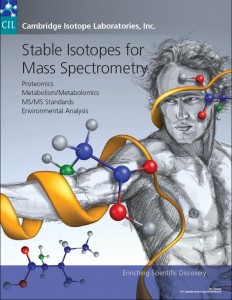
Mass spectrometry (MS) based proteomics has become an essential tool for biologists over the last decade. The ability of a mass spectrometer to identify thousands of proteins from a complex biological sample has revolutionised scientific experiments. To fully understand the function of the proteome in health and disease, however, one must have the ability to accurately quantify proteins in many different types of biological samples. The invention of faster and higher resolution mass spectrometers has enabled the quantification of complex proteome dynamics. Heavy stable isotopes are routinely employed to generate precise and accurate quantitative proteomic data. Peptides labeled with heavy stable isotopes share identical biochemical characteristics to “light” or unlabeled peptides except a difference in mass. Mixing heavy peptides with light peptides results in peptide pairs that co-elute into the mass spectrometer, which can easily distinguish between the peptides based on the mass difference. Quantifying differences between  proteomes subjected to different biological conditions or experiments can be achieved when using the heavy peptides as an internal standard or a control. CIL offers a variety of stable isotope reagents for labeling any proteome for quantitative MS analysis. These stable isotope MS methods are bringing scientists closer to curing human diseases through quantitative biomarker analysis and quantitative proteomic analysis of animal models of disease.
proteomes subjected to different biological conditions or experiments can be achieved when using the heavy peptides as an internal standard or a control. CIL offers a variety of stable isotope reagents for labeling any proteome for quantitative MS analysis. These stable isotope MS methods are bringing scientists closer to curing human diseases through quantitative biomarker analysis and quantitative proteomic analysis of animal models of disease.
All proteomics products can be found in our online catalogue or alternatively they can also be found in our Stable Isotopes for Mass Spectrometry catalogue. Specific product area pages are listed below and provide additional information and resources for each area. If you have any questions or would like to discuss any element of your proteomics work then please don’t hesitate to contact us.
Metabolic Labeling (SILAC)
Stable Isotope Labeling of Amino Acids in Cell Culture. A popular and simple MS technique that using heavy amino acids to metabolically label the proteome of cultured cells in vivo
Metabolic Labeling (SILAM)
SILAM is a labeling method that employs heavy amino acids or 15N to metabolically label rodent tissues in vivo.
Peptide Synthesis Reagents
Synthesised peptides with or without heavy stable isotopes are invaluable for targeted single reaction monitoring (SRM) assays and absolute MS quantitation. CIL offers amino acids and resin for synthesising peptides in your laboratory.
Chemical Tagging
Chemical tagging refers to labeling proteins or peptides in vitro. This inexpensive method is advantageous over metabolic labeling due to its ability to label human samples and its low cost. In addition, chemical tagging can quantify more than two samples in one MS experiment.
Enzymatic Labeling
One of the simplest methods of labeling peptides in vitro is the incorporation of 18O during proteolytic digestion.
Protein Expression
Expression of large amounts of unlabeled and labeled proteins in heterologous systems is an invaluable tool with numerous biological applications. CIL offers a variety of media for protein expression and kits for in vitro translation.
PeptiQuant™ MRM Assay Kits
To help researchers establish a stable LC-MRM/MS platform for bottom-up quantitative proteomics, Cambridge Isotope Laboratories, Inc. is pleased to offer PeptiQuant™ kits from MRM Proteomics Inc. These kits include the PeptiQuant™ Monthly LC-MS Platform Performance Kit, the PeptiQuant™ Daily LC-MS Platform Performance Kit, and the PeptiQuant™ Workflow Performance Kit. These innovative products are used to assess and track LC-MS performance of the LC-MS platform in a proteomic workflow in order to highlight any possible issues affecting quantitation.
Proteomics
Product Search
Got a Question?
For information please start your enquiry below:
